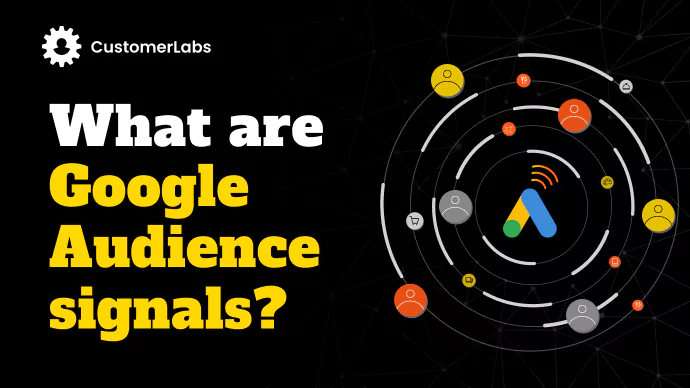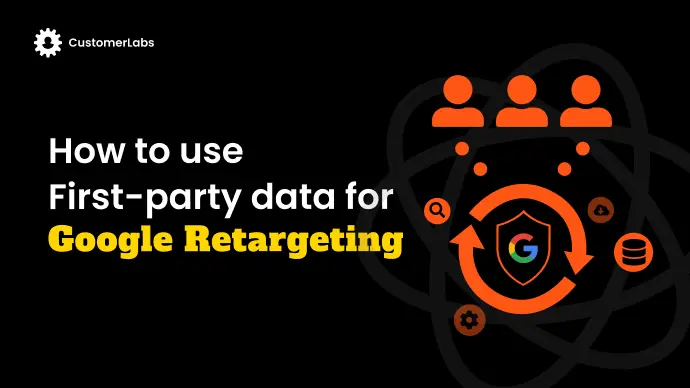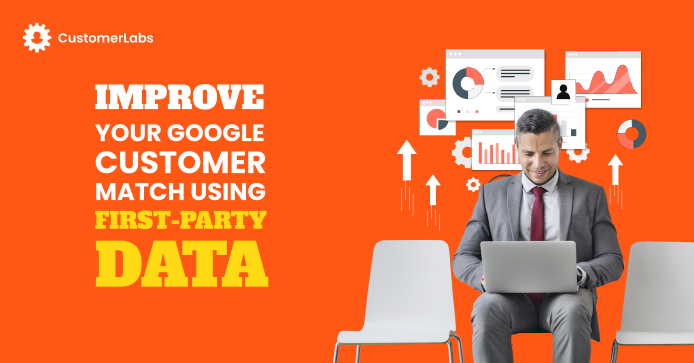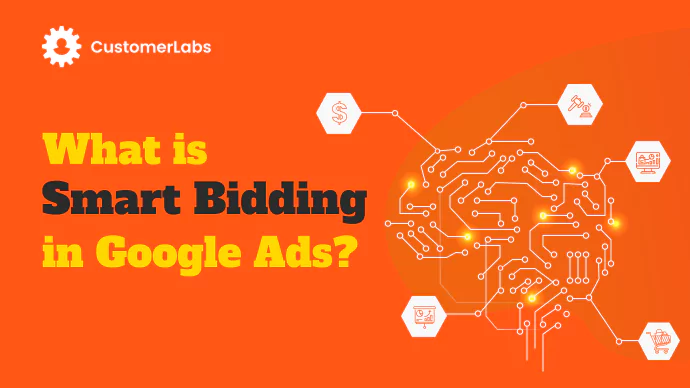
Machine learning and automation have changed the bidding scenario completely. Today even small accounts and novice Google Ads managers can bid seamlessly with no prior experience. Smart Bidding in Google Ads goes to that extra level to simplify the bidding process.
Earlier, with manual bidding PPC experts used to adjust the bid value based on the search query performance. Due to the manual efforts involved one could not adjust the bid for every auction. They used to adjust the bids only as per their capacity i.e., only a few times a day.
To encash the opportunity, bids should be adjusted in real-time for every search query. Adjusting the bid value in real time is very much needed in the rapidly changing era of automation.
Only when you optimize the bid value in real time you save the amount spent on ads while you achieve your goals.
This is where Smart Bidding enters the game.
What is Smart Bidding in Google Ads?
Smart Bidding is a subset of automated bidding strategies in Google Ads that uses machine learning algorithms to achieve the desired goal. Smart bidding strategy makes use of historical data such as the ad performance across other campaigns, and various audience signals to help the algorithm bid in real-time.
As of today, the goals Smart Bidding helps you with are, optimizing the ad campaigns either for maximize conversions (quantity) or conversion value (quality). Under the maximize conversions, target CPA bid strategy can be used and within the maximize conversion value, target ROAS bid strategy can be used.
Smart Bidding has a special feature known as auction-time bidding or real-time bidding. It simply means to set the bid value for each and every auction in real time and not just a few times a day.
Smart bidding offers the best bid value that is far better than the existing performance goals.
Smart bidding algorithms adjust the bid based on
- The aggregate performance of the ad campaign across the users
- Contextual-signals present at auction time such as
- User’s device location, browser, operating system
- Search query made, user intent, interest of the user
- Time of the day the ad is shown
- Ad creative shown to the user
Types of Smart Bidding Strategies in Google Ads:
Practically speaking, there are only two types of Smart Bidding Strategies in Google Ads that you can encash. However, if you split them they are of four types
- Maximize Conversions
- Target CPA (Cost per Action)
- Maximize Conversion Value
- Target ROAS (Return on Ad Spend)
Maximize Conversions:
In the maximize conversions smart bid strategy the ad algorithm strives to deliver the maximum number of conversions within the budget fixed. Therefore, few conversions may cost high and few conversions may cost low.
Target Cost Per Action (or tCPA):
In the maximize conversions bid strategy, you have an additional option to set a target cost per action. If you have already run a few campaigns and have a historic average target CPA, you get a suggestion at the bottom to set a target CPA. Once you click apply, Google Ads automatically fills the target CPA value.
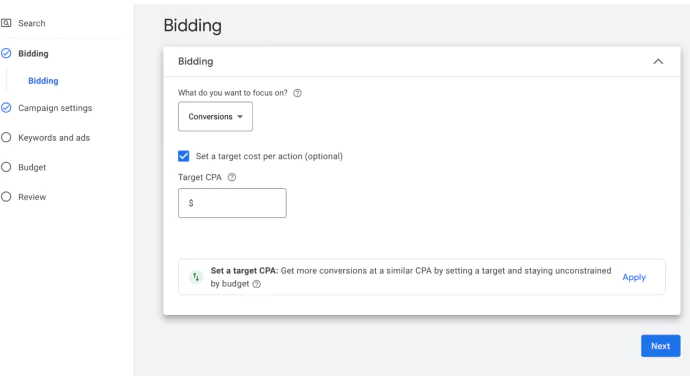
Maximize Conversion Value:
To maximize the conversion value for the ad campaign, rather than maximizing the number of conversions, you have to choose the maximize conversion value bid strategy. In this bid strategy, the ad algorithm will focus on getting more value for the conversions.
To understand it in detail, check out the value-based bidding blog.
Target Return on Ad Spend (tROAS):
The tROAS bid strategy is a little tricky. Do not opt for tROAS until and unless you receive at least 15 conversions in 30 days for display campaigns and at least 30 conversions for video action campaigns.
To know how long to wait for other campaigns, explore our guide on value-based bidding in Google Ads.
All these smart bidding strategies have their own pros and cons. Choose the right campaign based on your needs.
Smart Bidding Vs. Automated Bidding: What to choose and when to choose?
Smart bidding in Google Ads is an automated bidding strategy that uses machine learning to optimize the bids in the auction-time. Which means Smart Bidding is a subset of automated bidding or advanced automated bidding strategy as shown in the image below.
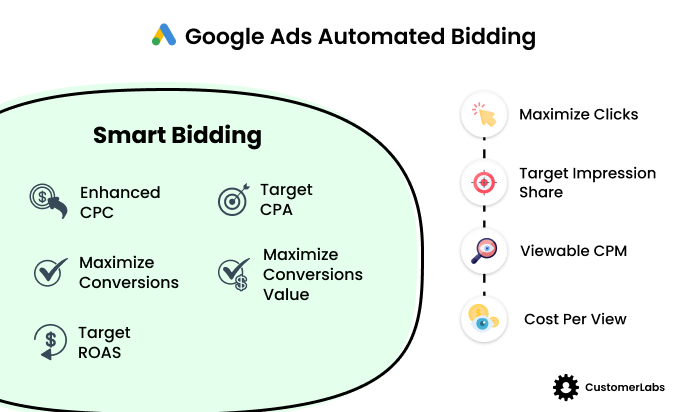
Confused about when to choose smart bidding? The below table will clear all your confusion and guide you to choose the right strategy.
| Business Goal | Campaign goal | Smart Bidding Strategy |
|---|---|---|
| Increase Sales or Leads | Get as many conversions as possible at a fixed budget or fixed cost per action. | Maximize Conversions, Target CPA |
| Increase Profit | Get as much conversion value as possible at a fixed budget or fixed return on ad spend (ROAS) | Maximize Conversion Value, Target ROAS |
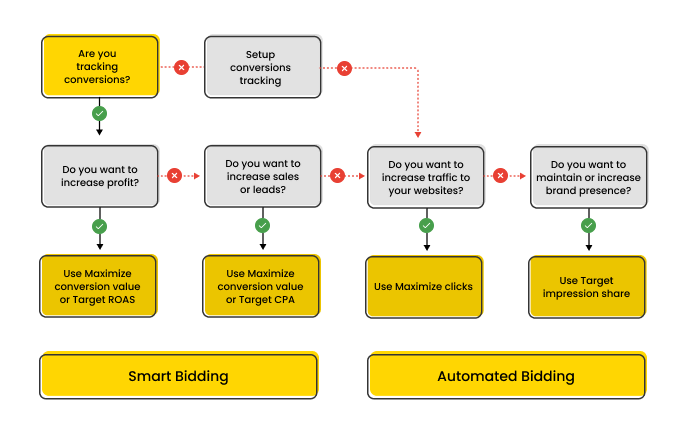
How Does Smart Bidding Work?
Smart bidding considers four things before setting up the bid value
- Contextual signals at the time of bidding
- Auction-time predicted conversion rate or conversion value per click
- Search query-level performance across all your campaigns
- The target budget/CPA/ROAS specified
Considering all the above, the algorithm will bid for the most optimal value to get the highest conversions/conversion value.
All of the above is done a million times for every bid in one second by the ad algorithm using its machine-learning capabilities. It remembers the previous bid, and based on the experience from the previous bid, audience signals & the above-said factors, the ad algorithm bids the best.
Who does the Smart Bidding Strategy help?
For any business, small or large, Smart Bidding is a go-to strategy for optimizing ad campaigns. For small businesses, the initial data for a new ad campaign will be less. In that scenario, smart bidding will still run with increased performance. That is because smart bidding campaigns use the data from all other campaigns and optimize the new ad campaign.
Any Google Ads expert who decides to use Smart Bidding must ensure that they are familiar with contextual signals. Because contextual signals help you determine if the the chosen bidding strategy works for your business or not.
Now how do you decide if it is working for you or not? To evaluate the smart bidding strategy, it is recommended to measure the performance of the campaign for at least until you get 30 conversions in a month. For target ROAS, have a benchmark of at least 50 conversions.
Benefits of Smart Bidding
When switched to Smart Bidding, it delivers the below benefits:
Auction-time Bidding:
Based on the user’s search intention for every single search, the smart bidding algorithm trains itself to bid the right amount using real-time insights.
Accurate Bid Amount:
Smart Bidding uses advanced machine learning algorithms to accurately predict the bid amount. The access to huge amounts of data from across the campaigns is an advantage that helps the algorithm predict the best possible bid amount.
Leverage Advanced Audience Signals:
With smart bidding, it is auction-time bidding and the ad algorithm uses multiple contextual audience signals to optimize the bids. The contextual signals include a combination of multiple signals as shown below. Using these contextual signals helps the ad algorithm impact the conversion rate significantly.

Search Query-level Conversion Performance Tracking:
Few keywords that have low-volume or are building performance do not have much conversion data. With the smart bidding algorithm you can bid effectively even on keywords that do not have any major performance history. Thus, the lack of data for individual keywords problem is resolved with the help of search query-level conversion data across your campaigns.
Ever-learning Algorithm:
The Smart Bidding algorithm trains & learns itself for every single bid and optimizes itself for future bidding. The algorithm analyzes the huge data it gathers and then tries to adapt to the changes in the bid performance to slowly sync with your campaign goals.
Pro Tip:
Use broad match when going for Smart bidding. Because the advantage of Smart bidding is making use of various available signals. With broad match, the ad algorithm will be able to understand the user’s search intent, keywords provided, and various other possible permutations and combinations to bid.

The exact and phrase match will not be able to leverage these combinations of signals. However, exact and phrase match can be leveraged for
- Target impression share campaigns for a specific set of search keywords.
- Campaigns where the focus is to target the users only for specific keywords based on industry.
- Competitor campaigns when you have a specific goal for a keyword with a specified budget.
Takeaway:
Smart Bidding is a great way to automate your entire bidding process while you help the algorithm learn your data and optimize the bids for reaching the required objective – conversions or conversion value.
Smart Bidding has changed the game altogether. The more quality data you provide to the ad algorithm, the better it learns. Choose the right bid strategy to target the right audience with the relevant ad creatives and the success is yours.
Happy Bidding!

